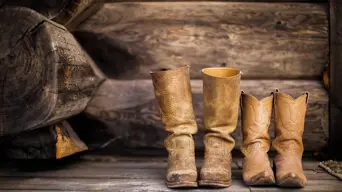Cowboy boots and all? South African ostrich leather caught in US tariff crossfire
Celeste Martin
26 August 2025 | 5:19The United States relies on South Africa for around 70% of its ostrich leather, used mainly in cowboy boots and western wear, a niche but lucrative market worth billions.

Picture: Pixabay I @ Pexels
Cape Talk's Lester Kiewit chats to Arno Albertyn, Executive Director for Leather at Klein Karoo International, in Oudtshoorn.
Listen to their conversation in the audio clip below:
South Africa’s ostrich industry has become an unexpected casualty in the United States trade war against the rest of the world, with a new 30% import tax on local leather exports shaking the boots, literally, of American manufacturers.
"Except for the aesthetic beauty of the ostrich leather, it is very durable... the cowboys love it. It is soft, it's a nice wear on their feet. They wear only cowboy boots in the southern parts of the United States. They don't only use it for dressing up, they use it for work wear as well."
- Arno Albertyn, Klein Karoo International
"... a pair of cowboy boots can cost you anything from $400 up to $5000... that's a lot of money. The Americans have a lot of money and are willing to spend on quality, and that is what ostrich gives them."
- Arno Albertyn, Klein Karoo International
ALSO READ: US tariffs could smash South Africa’s 365-year-old wine industry
Industry experts warn the tariffs could hike prices significantly, especially at the lower end of the boot market.
While premium buyers may still absorb the costs, manufacturers fear a decline in demand that could jeopardise both US and South African jobs.
"It takes about 200 hands to make one pair of cowboy boots. It is a huge industry; a huge job market for them."
- Arno Albertyn, Klein Karoo International
"The irony of it all is that we only supply one part of the raw material of the boot. So, that doesn't mean we are taking jobs away from the United States; we are actually giving them jobs... It's actually sad in a sense that we are contributing to their job market, but they don't see it like that, and now they will probably lose jobs and have to pay more for the product on the shelf."
- Arno Albertyn, Klein Karoo International
Albertyn says manufacturers are looking for alternatives, including routing through Mexico. But the long-term impact remains uncertain.
"It's a difficult situation. We've been talking to our agents in the USA to see what other plans we can make. We are very lucky to have about six months of stock already in the USA, so we got it in there before the tariffs hit, which gives us the opportunity for a little bit of planning here. Unfortunately, if nothing comes to the table, we will probably have to increase our prices..."
- Arno Albertyn, Klein Karoo International
ALSO READ: From negotiations with US to diversifying markets - how SA could handle Trump tariffs
Scroll up to listen to the full conversation.
Get the whole picture 💡
Take a look at the topic timeline for all related articles.
Trending News
More in Business

23 January 2026 15:01
Minister Ramokgopa: Structural reforms in energy and logistics now yielding R44.2 billion

23 January 2026 08:23
Rent control debate reignites as academic challenges Cape Town mayor’s stance

22 January 2026 11:48
Nearly 400 millionaires and billionaires call for higher taxes on ultra-wealthy













